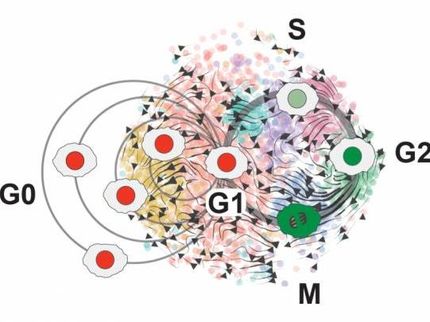Small protein is difficult for phagocytes to digest
Advertisement
Multiple myeloma is a type of bone marrow cancer that mainly affects people over the age of 60 and in many cases cannot be cured. Researchers at the University Hospital of the Friedrich-Alexander-Universität Erlangen-Nürnberg (FAU) have now found a new approach for a possible therapy of this cancer. They have published their research results in the scientific journal "Immunity".

Cancer cells
FAU / Colourbox.de
Multiple myeloma develops when a certain type of white blood cell, known as B cells, multiplies uncontrollably in the blood. As a result, bones are destroyed and patients also suffer from anemia, chronic infections and kidney problems. Although several effective chemotherapies are available, about one-third of patients do not respond to the available treatments. Even if the treatment works, the tumor is not cured but may eventually return. It was already known that the scavenger cells of the immune system, which are actually important for fighting off invaders in the body, work for the tumour in multiple myeloma. They support inflammation and thus promote the survival of the tumor and its growth.
The study by the FAU research team led by PD Dr. Heiko Bruns (Medical Clinic 5 - Hematology and Internal Oncology; Director: Prof. Dr. med. Andreas Mackensen) in cooperation with scientists from Milan has now discovered what happens at the molecular level when the phagocytes release inflammatory signals in the bone marrow. A blood component called beta-2-microglobulin seems to play an important role in this process. The more severely the bone cancer has affected the body, the more of this protein is detectable in the blood of the patients. The Erlangen team has now discovered that this is not just a side effect of the disease, but that this protein causes the phagocytes to make the disease worse. The protein is devoured by the macrophages - but not digested and degraded. In a sense, it lies heavy in the stomach of the phagocytes, which causes them to send out inflammatory signals that in turn benefit the tumor and its harmful effects in the body. The research team was able to prove that cancer can be significantly reduced if the researchers succeed in blocking these inflammatory signals.
Dr. Heiko Bruns summarizes: "Phagocytes, macrophages, are essential cells to defend our organism against tumor development. Many tumors are able to break through this line of defense because they manage to evade macrophage activity. We have seen that multiple myeloma employs an even more subtle strategy: It plays macrophage activity to its own advantage. Understanding how multiple myeloma achieves this is extremely relevant. Targeted blocking of the inflammasome could be a new adjuvant therapy strategy for patients in the future."
Note: This article has been translated using a computer system without human intervention. LUMITOS offers these automatic translations to present a wider range of current news. Since this article has been translated with automatic translation, it is possible that it contains errors in vocabulary, syntax or grammar. The original article in German can be found here.



























































